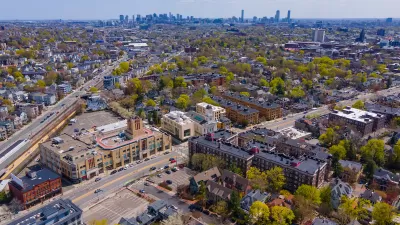In a city that survived the recession better than most, efforts to meet the demand for upscale housing will "change the face of the city for decades to come," reports Annys Shin.
According to Shin, the District's strong job market for young professionals, and a credit crunch that has made condominium conversion difficult, are putting immense pressure on the city's dwindling supply of affordable housing to undergo high-end makeovers. "As a result, low-cost rental housing is now disappearing at a faster rate than it was during the height of the housing boom, according to a new analysis of census data by the D.C. Fiscal Policy Institute...The Institute found that between 2000 and 2010, the city lost 50 percent of its low-cost rental housing. The rate of loss has accelerated since 2008, when the credit crunch began to slow condo conversions."
Writing in the City Paper, Lydia DePillis, asks whether the city's restrictive zoning, including its recently debated height limits, are a reason for the decline of housing affordability.
"It's true, affordable housing people were the driving force behind inclusionary zoning, and smart growth advocates are getting to agitate more forcefully for the city to require developers who want public land to incorporate affordable housing into their proposals. But many developers avoid the public land process altogether, preferring not to deal with all the delays and frustrations. And affordable housing shouldn't be all about setting prices artificially low-it's also about letting builders build the amount of housing this city needs."
FULL STORY: In D.C., low-cost apartments disappearing at rapid rate

Maui's Vacation Rental Debate Turns Ugly
Verbal attacks, misinformation campaigns and fistfights plague a high-stakes debate to convert thousands of vacation rentals into long-term housing.

Planetizen Federal Action Tracker
A weekly monitor of how Trump’s orders and actions are impacting planners and planning in America.

In Urban Planning, AI Prompting Could be the New Design Thinking
Creativity has long been key to great urban design. What if we see AI as our new creative partner?

King County Supportive Housing Program Offers Hope for Unhoused Residents
The county is taking a ‘Housing First’ approach that prioritizes getting people into housing, then offering wraparound supportive services.

Researchers Use AI to Get Clearer Picture of US Housing
Analysts are using artificial intelligence to supercharge their research by allowing them to comb through data faster. Though these AI tools can be error prone, they save time and housing researchers are optimistic about the future.

Making Shared Micromobility More Inclusive
Cities and shared mobility system operators can do more to include people with disabilities in planning and operations, per a new report.
Urban Design for Planners 1: Software Tools
This six-course series explores essential urban design concepts using open source software and equips planners with the tools they need to participate fully in the urban design process.
Planning for Universal Design
Learn the tools for implementing Universal Design in planning regulations.
planning NEXT
Appalachian Highlands Housing Partners
Mpact (founded as Rail~Volution)
City of Camden Redevelopment Agency
City of Astoria
City of Portland
City of Laramie





























